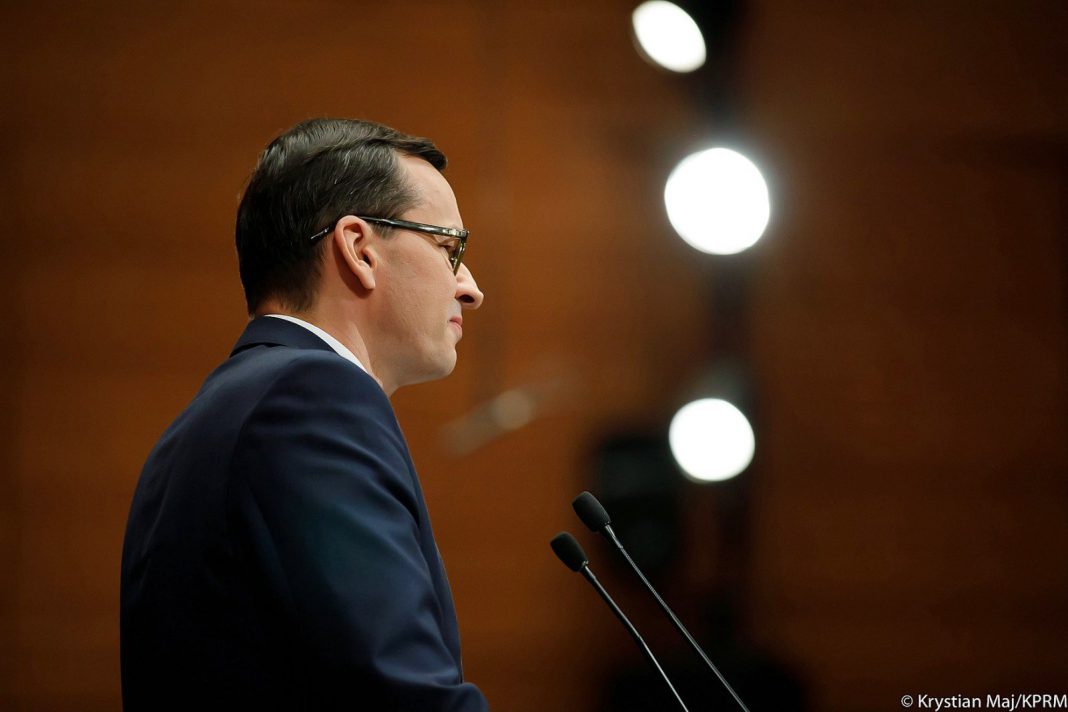By Mateusz MORAWIECKI, Prime Minister of the Republic of Poland
Lead: We are entering the third year of what has been an extremely difficult pandemic, face a growing economic crisis, and now there is an additional menace coming from our eastern neighbour. Vladimir Putin is effectively and cynically exploiting European weaknesses and crises.
Today, Europe is on the verge of war. Military conflict is no longer an unlikely scenario. It is a real option. For many generations of young Poles and Europeans, this is the closest they will have come to seeing such a scenario play out. For years, the West has wanted to believe that the 21st century would be free of armed confrontation. Recent years, however, have provided sufficient evidence that Russia’s aggressive actions, including in Georgia and Ukraine, are not an illusion but rather a sign that a new chapter is opening in the history of the West.
Russia is trying to violate Ukraine’s territorial integrity once again. Questioning the borders of a sovereign state can only mean one thing: an assault on European stability and security. The world as we know it, the world of European values, freedoms, democracy, and welfare has been targeted by Russia’s political and military leadership. It is not just the future of Ukraine that is at stake, but also the security and economic prosperity of Europe. This is the greatest political crisis since the end of the Cold War and is a direct challenge to the principles adopted by the Euro-Atlantic Community in the years following 1989.
Examining our Conscience
We have to confront the truth. Russia has posed an increasing threat to peace in recent years, and for the most part European governments have reacted passively. Many leaders have lacked the courage or determination to cut business ties with the Kremlin. The noose is tightening around Europe’s neck, not Moscow’s. The desire to engage in opaque business dealings with a regime that has had no qualms about waging war against smaller states, engaging in political assassinations, and employing special forces in subversion inside the territory of European Union member states cannot be simply perceived as short-sighted. This is a deliberate act of political cynicism.
This is coming at an increasing cost to Europe: we are losing the battle not only in economic terms (e.g., through high gas prices thanks to Moscow’s policy of blackmail), but also politically. Last year, Gazprom stepped up its gas exports to China and Turkey. At the same time, it sharply reduced deliveries to Europe. Its sales to European customers were down by 10 billion m3 on the year before and are as much as 27 billion m3 lower than in 2019. This artificial escalation of the energy crisis is a deliberate attempt to exert pressure aimed at forcing through the launch of Nord Stream 2. The people who will have to pay the price for this mistaken policy are not the ones signing the contract, but rather ordinary Europeans.
For all its madness, Russian policy is painfully rational. We are entering the third year of what has been an extremely difficult pandemic, face a growing economic crisis, and now there is an additional menace coming from our eastern neighbour. Vladimir Putin is cynically and effectively exploiting European weaknesses and crises. Unfortunately, many members of the European elites have become adept at blindfolding themselves to the dazzling rebirth of Russian imperial ambitions.
The list of political leaders who have opted for Russian roubles and lucrative stakes in Kremlin’s businesses is shocking and disheartening. We are all aware of the case of Gerhard Schroder who exchanged his political career for cash in Russian energy companies. But this is just the tip of the iceberg. Among the many European collaborators of Gazprom, Lukoil, Rosneft, and companies building Nord Stream 2 are former chancellors, prime ministers, senior diplomats, presidential advisors, and ministers.
Those who try to justify such a path speak of the free market and the right of these individuals to accept such jobs after years of public service. But these people have not gained positions by chance. Their knowledge and skills have become tools in Kremlin’s hands. As leaders of states, they helped forge European policies on energy, economy, and security. They had access to secret data, and to the materials drafted by special forces. They made strategic decisions that determined the future of the EU and NATO communities. Let us call them what they really are: Trojan horses used by Russia across Europe.
The Geopolitical Dimensions of NS2
Moscow’s intentions leave no room for doubt. Back in July last year, Vladimir Putin published an article on the historical relations between Russia and Ukraine. Its main thesis is the belief that there is no such thing as a separate Ukrainian nation, and that the Ukrainian people are part of what he terms the “Ruthenian nation”, in which the Russians play the dominant role. According to Putin, Ukraine is an inseparable part of the Russian world. In line with these optics, the efforts of Ukraine to assert its independence and a separate identity are not only an error. Even more so, they are a provocation. There is no place in Vladimir Putin’s vision for a free and independent Ukraine. This in turn means that Putin’s Russia has no respect for peace and international law. Putin’s objective seems clear: to make the West withdraw its support for Ukraine and allow Russia a free rein.
The NS2 gas pipeline is evidence itself that Putin’s scenario has its advocates across Europe. This project, which is suicidal for Europe’s energy future, casts a long shadow over German policy. Thanks to the pipeline, Gazprom will control gas flow across Europe, making deliveries contingent on political decisions. Such an arrangement is unacceptable not simply from a geopolitical perspective, but also in terms of the economy. We can already see that Russia is drastically cutting the transit of this resource via existing gas pipelines. Only a small proportion of the available throughput via Ukraine is currently being used, with Gazprom making no bookings of gas transit from the Yamal pipeline. Russia’s energy monopoly thus gives it a monopoly over any decisions regarding Ukraine’s sovereignty.
Europe Needs Unity
In the face of this menace what is needed is solidarity and cooperation throughout the continent. Europe and its Transatlantic Partners should treat the events currently taking place on the eastern border of the European Union as perhaps a final warning. The most effective bargaining chip that Europe and the USA can bring to the negotiation table are potential economic sanctions and a clear intention to block NS2. This should not just be the stance of Poland and other Central European countries. In these critical times, we need true leadership that will eliminate the present menace and restore Europe on its path of security and development.
The text is simultaneously published in the Polish monthly “Wszystko Co Najważniejsze” as part of a project carried out with the Institute of National Remembrance.














